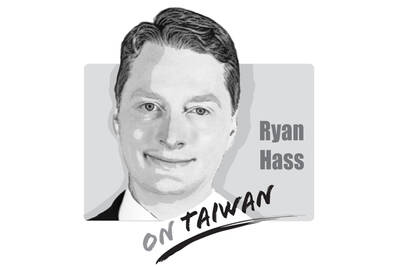Chung Yuan Christian University associate professor Chao Ming-wei (招名威) told a news conference in Taipei on Monday that the institute had forced him to apologize to a class after a Chinese student complained about remarks he made on the origin of COVID-19 and for saying that he was from the “Republic of China [ROC], Taiwan.”
If there were nothing more to it, it would be a total travesty that warrants a serious investigation of the university, as self-censorship, especially on campus, has no place in a free and democratic society — even more so when it is out of fear of Beijing.
If a university is so afraid of offending China that it bows when one Chinese student complains about Taiwanese sovereignty, that surely would be a problem — and is not likely to be an isolated incident.
It would indeed be “trampling on Chao’s character and the nation,” as Democratic Progressive Party Legislator Mark Ho (何志偉) said at the news conference.
However, the matter is not so simple.
He did not mention “ROC, Taiwan” during the lecture, but in his initial apology, in which he stated: “As an ROC, Taiwan professor, we do not discriminate against any individual, and if my speech during class made you unhappy, I apologize.”
The Chinese student was unhappy with the apology and lodged a second complaint. Chao was questioned again by university officials before being told to make a second apology.
Here is where things get confusing: In a recording of his conversation with the university that was played at the news conference, the officials seem to take exception to Chao saying he is from the “ROC, Taiwan” and asked why he emphasized that when he knew there were Chinese students in his class.
It is unclear whether the complainant mentioned Chao’s use of the phrase, but in any case, the university’s stance is completely unacceptable.
The Ministry of Education said that “no university lecturer in Taiwan needs to apologize for stating in class that they are from the Republic of China.”
However, Chao might not be completely without blame. After the news conference, the university released a transcript and video of Chao’s lecture, which showed that during a discussion on amino acids, peptides and proteins, he suggested that “certain” students had consumed too much tainted milk powder, adding: “Those across the Strait, you know, I’m talking about you.”
“If you really think the Wuhan pneumonia only killed 10,000 people, I’m talking about you, yes,” he said.
So it makes sense that the Chinese student was upset, at least initially. Anyone would be if they were called out in that way for no reason.
Despite constant bullying of Taiwan by Beijing, this kind of unnecessarily provocative behavior toward Chinese students is embarrassing and only brings Taiwanese down to the level of the Chinese Communist Party and Chinese netizens, who lose their marbles at any suggestion of Taiwanese sovereignty.
Their behavior can be infuriating, but that is no excuse to single out Chinese during a lecture.
The government is doing what it can to fight back — the latest example being the 22 airlines it convinced to correct the way they refer to Taiwan on their booking sites — but petty aggression toward Chinese who have done nothing wrong is not reasonable.

There has been much catastrophizing in Taiwan recently about America becoming more unreliable as a bulwark against Chinese pressure. Some of this has been sparked by debates in Washington about whether the United States should defend Taiwan in event of conflict. There also were understandable anxieties about whether President Trump would sacrifice Taiwan’s interests for a trade deal when he sat down with President Xi (習近平) in late October. On top of that, Taiwan’s opposition political leaders have sought to score political points by attacking the Lai (賴清德) administration for mishandling relations with the United States. Part of this budding anxiety
The diplomatic dispute between China and Japan over Japanese Prime Minister Sanae Takaichi’s comments in the Japanese Diet continues to escalate. In a letter to UN Secretary-General Antonio Guterres, China’s UN Ambassador Fu Cong (傅聰) wrote that, “if Japan dares to attempt an armed intervention in the cross-Strait situation, it would be an act of aggression.” There was no indication that Fu was aware of the irony implicit in the complaint. Until this point, Beijing had limited its remonstrations to diplomatic summonses and weaponization of economic levers, such as banning Japanese seafood imports, discouraging Chinese from traveling to Japan or issuing
On Nov. 8, newly elected Chinese Nationalist Party (KMT) Chairwoman Cheng Li-wun (鄭麗文) and Vice Chairman Chi Lin-len (季麟連) attended a memorial for White Terror era victims, during which convicted Chinese Communist Party (CCP) spies such as Wu Shi (吳石) were also honored. Cheng’s participation in the ceremony, which she said was part of her efforts to promote cross-strait reconciliation, has trapped herself and her party into the KMT’s dark past, and risks putting the party back on its old disastrous road. Wu, a lieutenant general who was the Ministry of National Defense’s deputy chief of the general staff, was recruited
The Food and Drug Administration (FDA) on Nov. 5 recalled more than 150,000 eggs found to contain three times the legal limit of the pesticide metabolite fipronil-sulfone. Nearly half of the 1,169 affected egg cartons, which had been distributed across 10 districts, had already been sold. Using the new traceability system, officials quickly urged the public to avoid consuming eggs with the traceability code “I47045,” while the remainder were successfully recalled. Changhua County’s Wenya Farm — the source of the tainted eggs — was fined NT$120,000, and the Ministry of Agriculture instructed the county’s Animal Disease Control Center to require that